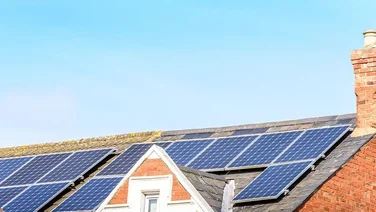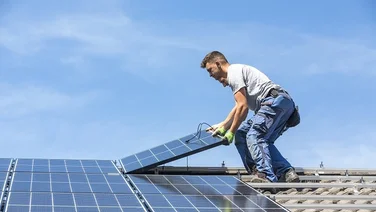We receive a small fee from trusted installers when you request a quote through our site. This helps us keep our content independent, well-researched and up to date – Learn more
✔ Adding panels to a multi-storey car park could cost over £400,000
✔ However, solar can reduce a car park’s overall operational costs
✔ Countries like France, China and the United States are in on the action
Solar panel-clad car parks represent a practical fusion of urban space and renewable power, transforming humble parking spaces into dynamic hubs of clean energy. And with the cost of solar panels decreasing by roughly 82% since 2010, it’s easier than ever to implement these types of projects.
Let’s take a look at how solar car parks are lighting the way towards a cleaner, greener future in our cities.

Can you put solar panels on a car park roof?
Just like we can install solar panels on homes, there’s no reason we can’t install them on car park roofs too.
However, just like with relatively smaller household spaces, it’s crucial that the installer also has the roof’s load-bearing capacity checked by a structural engineer to ensure the roof can support the combined added weight of the solar panels.
This is a vital step for safeguarding both the installation investment and the safety of the people/vehicles below it – otherwise, it risks becoming an insurance (and likely also a PR) nightmare.
Is it expensive?
The cost of covering a whole car park roof in solar panels can vary depending on factors such as size, location, and specific requirements, so the expense could range from tens of thousands to hundreds of thousands of pounds.
We recently crunched the numbers and found the average cost of 10 panels was around £7,860. A covered multi-storey car park of 2,000 m², potentially needing around 500-700 panels, could cost between £393,000-£550,220.
What are the benefits of putting solar panels on car park roofs?
- Efficient use of space
- Shade and vehicle protection
- Reduced energy costs
- Potential electric vehicle (EV) charging
It’s a similar process to installing solar panels on sheds. Car park roofs are usually sizable areas that receive plenty of sunlight throughout the day, making them efficient locations for solar installations. The direct overhead location means they can also double as shades in uncovered car parks, protecting vehicles from harsh sunlight and heat.
Cost-wise, solar can reduce the facility’s overall operational costs by offsetting the energy used for powering its lighting, ticket machines, and other electrical systems.
Plus, owners can sell the excess power back to the grid through the smart export guarantee (SEG) scheme, making them a good investment.
Finally, as urban life continues to shift towards EVs, car parks equipped with solar panels can also serve as solar charging stations – especially in places like shopping centres and office buildings, where people usually park for hours at a time.
Are there any downsides?
As we saw above, the initial investment for this scale of installation can be significant, although this can balance out over time with both energy savings and government incentives.
And while solar power generation is a resourceful use of these otherwise unused urban spaces, alternatives like creating urban gardens or community spaces might be more suitable for the needs of the local area.
Professional input is needed for solar panel maintenance, and solar panels are susceptible to damage from severe weather, both of which will incur extra costs.
Where in the UK have they put solar panels on car park roofs?
In the UK, the vision of solar panel-equipped car parks is already a reality. Across the country, many car parks are getting an eco-friendly upgrade to harness the sun’s energy right above our cars and vans.
Let’s explore some examples.
Bentley Motors HQ, Crewe
Bentley Motors turned its commitment to sustainability into action by installing the UK’s largest solar carport at its Crewe headquarters.
Comprising 10,000 solar panels with a 2,700 kilowatt (kW) capacity, the carport covers 1,378 parking spaces over 16,426 m² – an area roughly equivalent to the size of two football pitches. This installation took Bentley’s total on-site solar energy capacity to 7,700 kW.
According to the company, all electricity used in Bentley’s manufacturing process is now solar-generated or certified green.
BBC, Glasgow
Completed in time for the momentous COP26 event in 2021, BBC Glasgow’s unique solar carport and rooftop solar PV system was a first for all BBC sites in the UK.
The BBC’s installation is reported to generate an impressive annual output of 822,600 kilowatt-hours (kWh), saving over 174,663kg of CO2e in its first year.
Future-proofing was key to the project, so the system can also accommodate a battery energy storage system and additional EV chargers, powered by the generated solar energy.
Harvey Hadden Sports Village, Nottingham
Nottingham City Council’s solar carport at the Harvey Hadden Sports Village picked up the ‘Innovation of the Year’ accolade at the Nottingham Post’s 2015 Environmental Awards.
The solar carport, made up of 448 modules over 40 parking spaces, is estimated to generate around 55,700 kWh of electricity every year – enough to power over 20 average-sized three-bedroom homes.

Which other countries are putting solar panels on car park roofs?
The UK isn’t alone in harnessing the power of solar car parks. This globally emerging trend has found footholds in several countries, so let’s globe-trot to see how other countries are showing their unique take on the sustainable energy solution.
France
Although you can find the world’s largest solar carport in the Netherlands, its Western European neighbour, France, is making massive strides towards sustainable energy use with its new law mandating solar panels on large outdoor car parks.
Under the proposed legislation, car parks with over 80 spaces have up to five years to install “photovoltaic shades” which will generate electricity while keeping cars cool.
It’s been widely reported that this law, expected to take effect in July 2023, could give France an additional 11 gigawatts of power (equivalent to the power of 10 nuclear reactors) – a big step for its push towards more affordable and cleaner energy sources.
China
Given its status as the largest employer in the renewable energy sector, it makes sense that Chinese businesses are pretty comfortable embracing solar-powered car parking spaces.
The country’s eastern Anhui province features several solar parking areas, including office buildings, factories, and high-speed service zones.
One of the province’s largest solar carports, at the Anhui Quanchai Engine Company, can accommodate over 160 vehicles, generating around 330,000 kWh of green power every year. That’s enough solar to power over 120 homes.
United States
Solar car parks also are making a big impact across the United States, representing a strategic investment in renewable energy for businesses.
High-profile companies, like Target, are leading the way with the installation of massive solar panel-topped carports. For instance, one of Target’s California stores is not only powered entirely by solar panels but also contributes surplus energy to the local grid, creating a net-zero energy setup.
Other big retailers such as Home Depot and Lowe’s have also adopted solar panel installations on their premises. This trend showcases a significant step towards nationwide sustainable practices.
Summary
Car park solar panels are an effective space-saving, cost-reducing, vehicle-protecting, eco-friendly measure that can also support green EV charging.
It’s no surprise that businesses are wholeheartedly adopting this sustainable solution, leading the charge for a solar-powered revolution in the UK and beyond.
Solar panels on cars might also be the future. Head to our page to find out why.
FAQs
Can I run a car off solar panels?
Yes, it’s possible to run an electric vehicle (EV) using power from solar panels. The panels can charge the car’s battery, effectively using solar energy for propulsion.
However, the practicality depends on factors like panel size, efficiency, sunlight exposure, and the car’s energy consumption rate.
Can solar panels be fitted to a park home?
You can fit solar panels to park homes, but it requires careful assessment. Like any structure, the roof of a park home must be structurally sound to bear the weight of the panels.
It’s also important that the roof receives ample sunlight, unobstructed by shading from trees or other buildings.
Why haven’t they put solar panels on cars?
Incorporating solar panels on cars is technically feasible but presents challenges. Panels need large, flat surfaces for efficient energy generation – space that cars can’t yet provide adequately.
The intermittent nature of sunlight and the power required to drive a car also limit solar power’s effectiveness. However, technological advancements could make it more common in the future.








